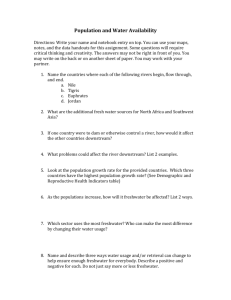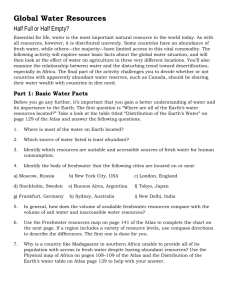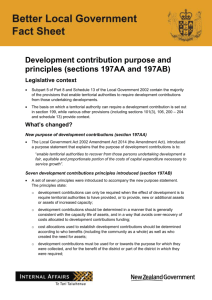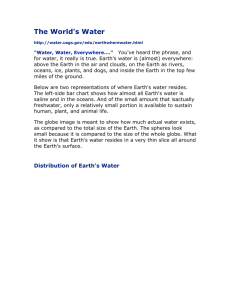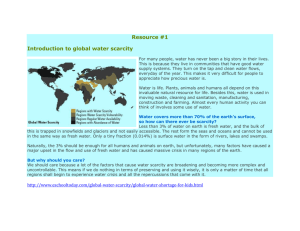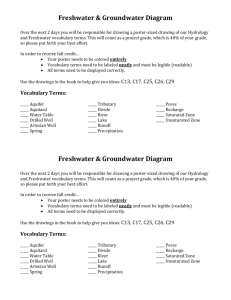The National Policy Statement for Freshwater Management 2014 A
advertisement
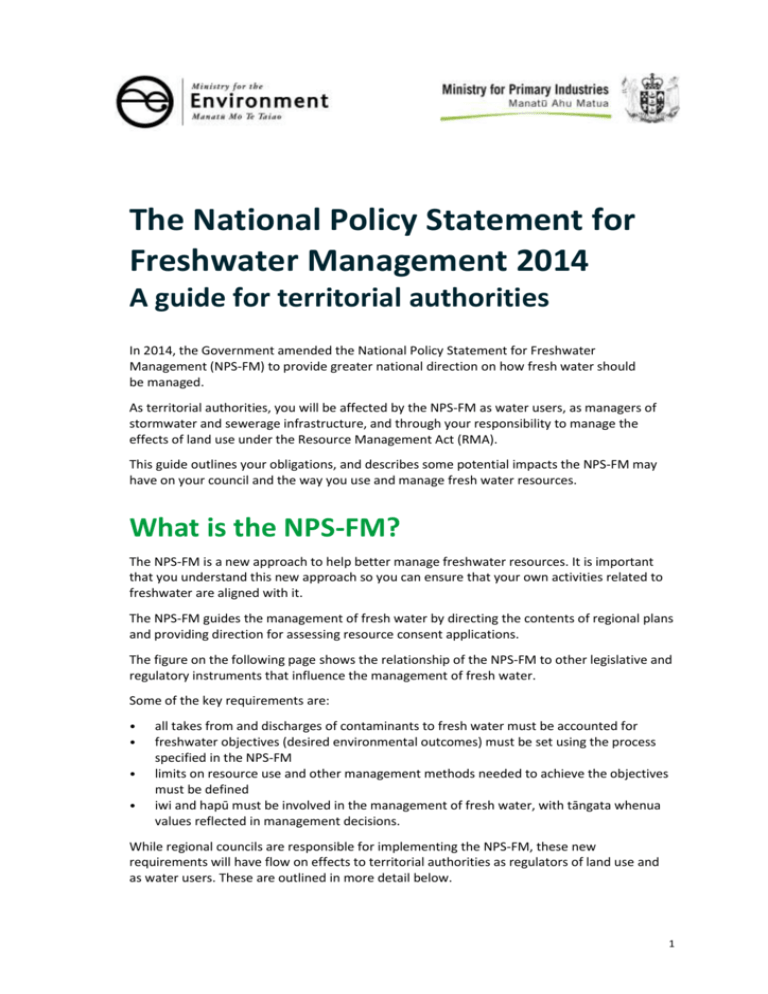
The National Policy Statement for Freshwater Management 2014 A guide for territorial authorities In 2014, the Government amended the National Policy Statement for Freshwater Management (NPS-FM) to provide greater national direction on how fresh water should be managed. As territorial authorities, you will be affected by the NPS-FM as water users, as managers of stormwater and sewerage infrastructure, and through your responsibility to manage the effects of land use under the Resource Management Act (RMA). This guide outlines your obligations, and describes some potential impacts the NPS-FM may have on your council and the way you use and manage fresh water resources. What is the NPS-FM? The NPS-FM is a new approach to help better manage freshwater resources. It is important that you understand this new approach so you can ensure that your own activities related to freshwater are aligned with it. The NPS-FM guides the management of fresh water by directing the contents of regional plans and providing direction for assessing resource consent applications. The figure on the following page shows the relationship of the NPS-FM to other legislative and regulatory instruments that influence the management of fresh water. Some of the key requirements are: • • • • all takes from and discharges of contaminants to fresh water must be accounted for freshwater objectives (desired environmental outcomes) must be set using the process specified in the NPS-FM limits on resource use and other management methods needed to achieve the objectives must be defined iwi and hapū must be involved in the management of fresh water, with tāngata whenua values reflected in management decisions. While regional councils are responsible for implementing the NPS-FM, these new requirements will have flow on effects to territorial authorities as regulators of land use and as water users. These are outlined in more detail below. 1 Legislative and regulatory instruments that influence the management of fresh water Regulatory requirements for territorial authorities The NPS-FM does not directly require territorial authorities to include specific provisions in your district plans related to fresh water. However, as a territorial authority, you are required to ‘give effect’ to the NPS-FM in your district plans, and to ‘have regard’ to the NPS-FM in determining applications for resource consents. A district plan must also give effect to the regional policy statement and must not be inconsistent with provisions of a regional plan that control the use of land. 2 The table below provides a summary of your obligations under the NPS-FM. Obligations of territorial authorities under the NPS-FM Requirements Obligations of territorial authorities Planning requirements Where a regional policy statement adopts a policy or a regional plan introduces provisions that affect land use, you must give effect to it in your district plan. For example, if your regional council introduces requirements for water sensitive urban design, your district plan must reflect this. Where a regional policy statement adopts a policy directing urban growth, land development, and the provision of infrastructure, you must give effect to this in your district plan. This is because the NPS-FW requires an integrated management approach that considers the links between land, water, ecosystems, and coastal water. Where changes to plans are required to give effect to any measure directed by the NPS-FM, you need to take reasonable steps to involve iwi and hapū in your planning processes. Decision-making requirements You must have regard to the NPS-FM when making decisions about consents and decisions or recommendations about designations. In summary, if your regional council adopts a policy in its regional policy statement on the management of contaminants associated with a particular land use, you will need to give effect to the policy in any district rules controlling that land use. For example, if a limit on sediment is set by your regional council (in the regional plan), rules in your district plan controlling sediment-generating activities such as earthworks or urban development will need to be reviewed and, if necessary to give effect to that limit, updated. Impacts of the NPS-FM on territorial authorities as water users As providers of drinking water, wastewater, and stormwater services, you are major water users with a significant role to play in the wider management of fresh water. The NPS-FM will likely have impacts beyond planning requirements associated with district plans. The NPS-FM requires regional councils to set freshwater objectives. These outline the desired environmental outcome and guide the management of freshwater resources through the setting of limits on resource use and other management methods. Implementing the NPS-FM and setting freshwater objectives and limits may require changes in how you operate your three waters services infrastructure in the future. For example, if freshwater objectives are set to decrease the E. coli levels in a catchment, rules to support that objective will likely require the quality of any discharges to water associated with stormwater or wastewater services to be improved. Similarly, water abstractions for water supply could be affected by the setting of environmental flow limits or levels. You will need to consider these changes so they can be accommodated within the long-term planning and operation of your key water infrastructure and services. 3 Participating in implementing the NPS-FM While regional councils have primary responsibility for implementing the NPS-FM, as a territorial authority, you are also involved (as required under the RMA and relevant local government legislation). You will need to participate in planning processes as both water users and as representatives of your communities. Participation may be through collaborative groups, technical focus groups, or through formal submissions. Active participation in collaboration is an effective way to work with your community as well as ensuring that any impacts on your ability to deliver your services are minimised. By working alongside the regional council you will ensure the impacts of the NPS-FM in your district are understood and land-use management is aligned with the NPS-FM so it can be effectively implemented. Next steps We would like to work with you to explore what guidance and implementation support we can provide to help you implement the NPS-FM. We encourage you to get in touch with us at freshwater.guidance@mfe.govt.nz if you have any questions or would like to be involved in future discussions about this. Find out more Further information about the NPS-FM is available on our website at www.mfe.govt.nz/fresh-water/freshwater-management-nps. Disclaimer The information in this publication is, according to the Ministry for the Environment’s best efforts, accurate at the time of publication. The Ministry will make every reasonable effort to keep it current and accurate. However, users of this publication are advised that: • • • The information provided has no official status and so does not alter the laws of New Zealand, other official guidelines or requirements. It does not constitute legal advice, and users should take specific advice from qualified professionals before taking any action as a result of information obtained from this publication. The Ministry for the Environment does not accept any responsibility or liability whatsoever whether in contract, tort, equity or otherwise for any action taken as a result of reading, or reliance placed on this publication because of having read any part, or all, of the information in this publication or for any error, or inadequacy, deficiency, flaw in or omission from the information provided in this publication. Published in November 2015 by the Ministry for the Environment Publication number: INFO 753 4
